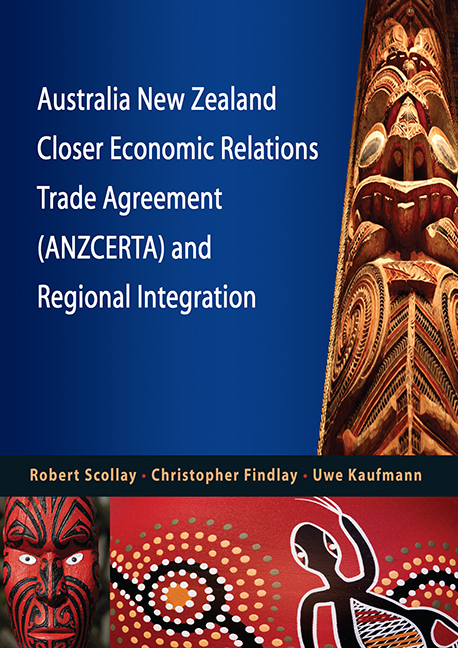Book contents
- Frontmatter
- Contents
- Foreword
- Australia New Zealand Closer Economic Relations Trade Agreement (Anzcerta) and Regional Integration
- Executive Summary
- 1 Introduction
- 2 Background
- 3 Pre-ANZCERTA Trade Arrangements
- 4 Early Years of ANZCERTA
- 5 Consolidation of ANZCERTA
- 6 Deepening Integration
- 7 Pursuit of a Single Economic Market (SEM)
- 8 Further Monetary Integration: A Monetary Union?
- 9 The Economic Effects of ANZCERTA
- 10 Conclusion
- References
- About the Authors
2 - Background
from Australia New Zealand Closer Economic Relations Trade Agreement (Anzcerta) and Regional Integration
Published online by Cambridge University Press: 21 October 2015
- Frontmatter
- Contents
- Foreword
- Australia New Zealand Closer Economic Relations Trade Agreement (Anzcerta) and Regional Integration
- Executive Summary
- 1 Introduction
- 2 Background
- 3 Pre-ANZCERTA Trade Arrangements
- 4 Early Years of ANZCERTA
- 5 Consolidation of ANZCERTA
- 6 Deepening Integration
- 7 Pursuit of a Single Economic Market (SEM)
- 8 Further Monetary Integration: A Monetary Union?
- 9 The Economic Effects of ANZCERTA
- 10 Conclusion
- References
- About the Authors
Summary
There are a number of characteristics of Australia and New Zealand, and the relations between them, that are important for an understanding of the economic integration achieved through ANZCERTA and subsequent developments.
Constitutional and Legal Issues
The common origin of Australia and New Zealand as former colonies of Britain means that both countries have similar, though by no means identical, systems of law, based on common law.
Both countries are long-established democracies, with strong democratic institutions.
Australia is a federation, in which the federal or Commonwealth government shares powers over economic policy with the six Australian state governments. New Zealand does not have a state level of sub-national government. There is provision in the Australian constitution for the North Island and South Island of New Zealand to join the Australian federation as separate states, but there has not been any serious discussion on exercising this option, at least in recent times, although New Zealand commentators occasionally speculate about the possibility and potential merits of political union with Australia.
Social and Political Links
There has traditionally been a strong sense of community between the peoples of Australia and New Zealand, traceable in many ways to the common colonial heritage, and symbolized by the ANZAC tradition of military cooperation that remains revered in both countries. Divergent immigration policies in the last several decades have led to a significant difference in the ethnic composition of the two populations, and this in turn has tended to dilute the sense of community, which nevertheless remains an important factor in bilateral relations.
There has been political divergence as well, most notably in relations with the United States, with New Zealand's adoption of a “no nuclear” policy in the 1980s leading to the effective suspension of the Australia, New Zealand and United States Security (ANZUS) Treaty, and more recently the sharply divergent approach of the two countries towards support for the Iraq War. Australia has often been sharply critical of what it views as inadequate levels of defence expenditure by New Zealand, seeing this as “free riding” by New Zealand on Australia's much more substantial defence effort. Despite these differences, the governments in both countries have traditionally placed a high priority on strong bilateral political relations.
- Type
- Chapter
- Information
- Australia New Zealand Closer Economic Relations Trade Agreement (ANZCERTA) and Regional Integration , pp. 19 - 22Publisher: ISEAS–Yusof Ishak InstitutePrint publication year: 2010



